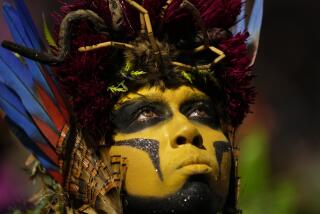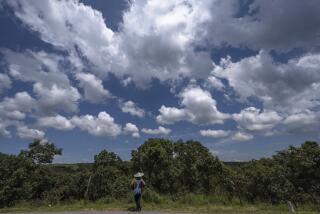Isolated Tribe Wary of Western Visitors
- Share via
ASHIDOWA-TERI, Venezuela — A brave handful of Yanomamis stood, hooted and waved excitedly as the Venezuelan air force chopper roared into their village.
Others, however, clung for dear life to tree trunks in the jungle canopy, emerging only after the infernal noise and wind died down.
Some were adorned with red paint on their face and shoulders, and wore brilliant feather earplugs. One carried a fistful of the 7-foot-long arrows the tribe uses for hunting. Most wore only a string or small strip of cloth at the waist or groin.
All were wide-eyed with curiosity. The villagers said it was the first time most of them had ever seen non-Yanomamis.
“They don’t know about the threat our culture represents to them,” said Venezuelan naturalist Charles Brewer-Carias, an advocate of Yanomami rights who arranged the helicopter visit. “That’s the real catastrophe.”
One traveling tribesman from another village, who was at Ashidowa-Teri to obtain tobacco, had spent some time at a Catholic mission and knew some rudimentary Spanish.
And he was worldly: Although he’d never been out of the forest, he said he had heard of Venezuela, of Colombia, of Caracas and another town called San Fernando.
He stared into the eyes of one of the visitors, to see if he also had heard of these places.
Others touched and rubbed the visitors, feeling the weave of their Western clothing, and spoke in the abrupt Yanomami tongue.
Women and children remained inside the village’s one structure, a thatch roundhouse with a roof open at the middle and a dirt floor.
The children were clearly upset by the visitors’ unusual appearance, and perhaps by the noisy chopper.
In one hammock, a teen-age mother hugged a boy of about 2 and cried out repeatedly. “She’s saying the boy’s scared,” said U.S. anthropologist Napoleon Chagnon.
The helicopter delivered a team of anthropologists, physicians, botanists and others engaged in research or medical care programs. They planned to remain in the jungle for a week or longer, hiking from Ashidowa-Teri, near the Brazilian border and the Orinoco River, to other nearby villages.
Ashidowa-Teri sits in a vast and hilly, emerald-green forest laced with twisting black rivers and streams. Insects buzzed noisily in the sweltering noon heat, but the roundhouse’s partial roof--not to mention the dense jungle canopy--offered shelter from a blazing sun.
Hanging under the roofed sections of the roundhouse were tightly woven baskets and hammocks made of tree bark or crudely spun cotton that had been dyed red.
Each family--a man, a couple of wives and perhaps three children--occupied a separate space, kept its own fire and cooked its own food. Above the hammocks dangled bones, skins and other trophies from hunting, along with bananas and other produce from the family’s hillside garden plots outside the roundhouse.
Some outsiders liken the Yanomami’s world to a kind of rain forest Eden, innocent and idyllic. But there is much evidence of life’s hardships.
Many villagers bear rows of scabs, welts and rashes from insect bites. Some have scars from apparent accidents. Anthropologists say the Yanomami periodically stage raids on other villages, killing the men and carrying off the women.
But in thousands of years of existence, they’ve left the life-giving forest intact.
“Their culture is superior to ours, in that it works in their environment,” Brewer-Carias said.
“Our civilization isn’t working for us, so how can we push it on someone else?”
More to Read
Sign up for Essential California
The most important California stories and recommendations in your inbox every morning.
You may occasionally receive promotional content from the Los Angeles Times.













